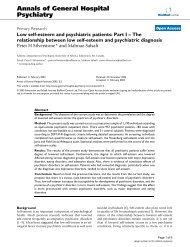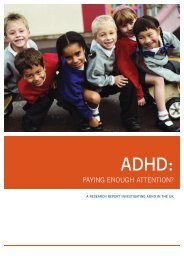Attention Deficit Hyperactivity Disorder - ADDers.org
Attention Deficit Hyperactivity Disorder - ADDers.org
Attention Deficit Hyperactivity Disorder - ADDers.org
Create successful ePaper yourself
Turn your PDF publications into a flip-book with our unique Google optimized e-Paper software.
UpdatesMENTAL HEALTH FOUNDATIONBACKGROUNDADHD is used to describe children who are overactive, impulsive and have difficultyin paying attention. In the UK, about 0.5 to 1% of children are thought to haveattention or hyperactivity problems. Children with ADHD are easily distracted, findit hard to carry out tasks which involve waiting to respond, and have a shortattention span. They frequently underachieve at school, and may also have problemsgetting on with other children. It is therefore important to identify ADHDsymptoms before children go to school, so that they can receive help.Many school-age children with ADHD benefit in the short-term from stimulantmedication, although the benefits are not always maintained. Medication appears tobe less effective with pre-school children, and there are particular concerns about theside-effects of prescribing drugs to young children. Parent training programmes offeran alternative approach, which may be more acceptable to parents than drugs.In their initial study (The New Forest Parent Training Study), Professor Sonuga-Barke and colleagues evaluated two kinds of intervention: parent training (PT) andparent counselling/support (PCS). Children in the PT group showed a significantlygreater reduction in ADHD symptoms than children in the PCS or control groups.The next step was to evaluate whether this kind of intervention can be delivered aspart of routine practice, so that more children and parents can receive help. The aimof the current study was therefore to evaluate the effectiveness of the interventionwhen delivered by trained (but non-specialist) health visitors as part of their everydaycaseload.THE RESEARCH●●●All children in one health district were screened during their routine three-yeardevelopmental check. Parents completed the Werry-Weiss-Peters Activity Scale(Routh 1978) which identifies activity problems in the general population.Parents whose children scored over 20 points on this measure were invited tojoin the study. Parents who agreed to participate were then screened again usingthe Parental Account of Childhood Symptoms Interview (Taylor et al 1993). 79children met the diagnostic criteria for ADHD on both measures. 59 wereallocated to the parent training group and 20 to the control group.15 Health Visitors were randomly selected to deliver the parent training. Parentsin the intervention group received eight one-hour visits, which included adviceon communication, distraction techniques, ways of dealing with tantrums, andother behaviour management techniques.The children were assessed before and after the intervention and at 15 weekfollow-up, using the Parental Account of Childhood Symptoms Interview(PACS), ten minute observations of the child playing with a toy, and ten minuteobservations of the mother playing with the child. The mothers completed theGeneral Health Questionnaire (GHQ) (Goldberg 1978) and the Parental Sense ofCompetence Scale (Mash & Johnston 1989).




